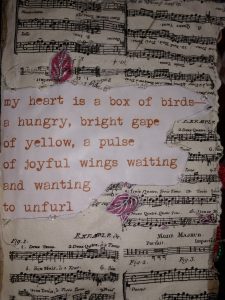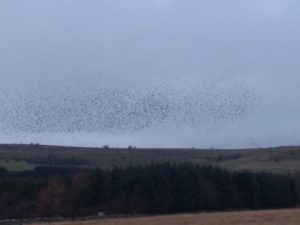You can read this poem here.
Whenever I’ve shared poetry in groups, and we’ve explored this poem, it has always had resonances for the participants. Whether the groups are about loss, mortality, love of nature, mindfulness, the search for meaning, ways to live more happily in this bewildering, bruising but also beautiful world… whatever the immediate focus, people find nourishment in this poem. It speaks to them.
The images of death are so simple, but so powerful. That death should ‘[snap] the purse shut’ calls to my mind those old-fashioned purses with the cross-over clasps with spheres on the end of little stalks, which slide across and past each other and shut with such satisfying conviction. I can feel them ‘snap’ home under my fingers as I read those words. Death as a ‘hungry bear in autumn’, feeding urgently, because it must, and willing to take whatever it comes across; death as the dreadful shock of the ‘iceberg between the shoulder blades’—something that dwarfs us and mows us down, without malice or intention, simply because of what it is, and where we happen to be… I find these images unforgettable.
How amazing, though, is where, in Oliver’s hands, these images lead us. Not to lamentation (or not explicitly); but rather, to an honouring of what unites us; to an openness to possibilities; to an acceptance that we all must ‘tend towards silence’; to an honouring of all life as something ‘precious’: and to the determination to live as vividly, intensely, fully as possible. That importance of the distinction between visiting and living isn’t spelled out, but has a quiet profundity which convinces me entirely. This poem gives me a way to think about how I want to live: I don’t want simply to be a visitor here: I want to live here, to belong here, to be a fully-involved citizen of this world, for as long as I am given. And Oliver even suggests how we may do this: by being both bride and bridegroom, ‘married to amazement’, and ‘taking the world in [our] arms’. That might not entirely prevent me being ‘sighing and frightened,/or full of argument’, but it it feels like the very most I can do to minimise that.
Thank you, Mary. I’m so grateful for this poem.
 I can still see it now: the hand-made razor-cleaning-brush holder, approx. three inches by half an inch, knitted in uptightly-tense garter stitch in DK wool in variegated tones of blue by my 7-year-old self.
I can still see it now: the hand-made razor-cleaning-brush holder, approx. three inches by half an inch, knitted in uptightly-tense garter stitch in DK wool in variegated tones of blue by my 7-year-old self. At the beginning of part two of his autobiography, Clive James comments on his first sight of snow and the English cityscapes, noting: ‘what I was seeing was a familiar [sight] made strange by being actual instead of transmitted through cultural intermediaries’. Replace the word ‘strange’ in that sentence with ‘make-you-weep wonderful’ and you have something of what it was like to see a murmuration of starlings. I’ve seen them on TV and youtube, seen the images reproduced
At the beginning of part two of his autobiography, Clive James comments on his first sight of snow and the English cityscapes, noting: ‘what I was seeing was a familiar [sight] made strange by being actual instead of transmitted through cultural intermediaries’. Replace the word ‘strange’ in that sentence with ‘make-you-weep wonderful’ and you have something of what it was like to see a murmuration of starlings. I’ve seen them on TV and youtube, seen the images reproduced